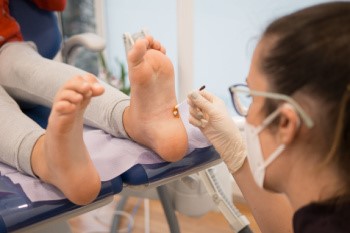Connect With Us
Items filtered by date: April 2024
How a Plantar Fibroma Is Diagnosed
 Plantar fibroma is a condition where a benign lump forms within the plantar fascia, the band of tissue that runs along the bottom of the foot. This lump is made up of connective tissue and is usually located in the arch of the foot. It can cause discomfort or pain as pressure is applied to the area, especially when standing or walking. Diagnosing a plantar fibroma typically involves a physical examination from a podiatrist, or foot doctor. The podiatrist may feel the lump in the foot's arch and might confirm the diagnosis through imaging tests, such as ultrasound or MRI. These tests help to visualize the fibroma's size and exact location within the plantar fascia to ensure it is not something else. Early diagnosis and treatment are important to manage symptoms and prevent the fibroma from worsening. If you have a lump in the arch of the foot, it is suggested that you promptly schedule an appointment with a podiatrist for diagnosis.
Plantar fibroma is a condition where a benign lump forms within the plantar fascia, the band of tissue that runs along the bottom of the foot. This lump is made up of connective tissue and is usually located in the arch of the foot. It can cause discomfort or pain as pressure is applied to the area, especially when standing or walking. Diagnosing a plantar fibroma typically involves a physical examination from a podiatrist, or foot doctor. The podiatrist may feel the lump in the foot's arch and might confirm the diagnosis through imaging tests, such as ultrasound or MRI. These tests help to visualize the fibroma's size and exact location within the plantar fascia to ensure it is not something else. Early diagnosis and treatment are important to manage symptoms and prevent the fibroma from worsening. If you have a lump in the arch of the foot, it is suggested that you promptly schedule an appointment with a podiatrist for diagnosis.
A plantar fibroma may disrupt your daily activities. If you have any concerns, contact one of our podiatrists from Podiatry Health Center. Our doctors can provide the care you need to keep you pain-free and on your feet.
Plantar Fibroma
A plantar fibroma is a fibrous knot in the arch of the foot. It is embedded in the plantar fascia which is a band of tissue that extends from the heel to the toes along the bottom of the foot. There can be multiple plantar fibromas in the feet at the same time. There are no known causes for this condition. If you have a plantar fibroma, there will be a bump in the arch of your foot that cannot be missed. Any associated pain is most often due to a shoe rubbing against the nodule. Non-surgical options, such as steroid injections, physical therapy, and orthotics should be tried first. Surgery is a last resort and is the only thing that will remove a plantar fibroma entirely. Consult with a podiatrist for a proper diagnosis and to determine the treatment regimen that is right for you.
What Causes a Plantar Fibroma?
While there are no specific causes identified, a plantar fibroma can possibly come from genetic predisposition or the formation of scar tissue that forms from healing the tears in the plantar fascia.
What Are the Symptoms of a Plantar Fibroma?
There will be a noticeable lump in the arch of the foot that may or may not cause pain. If pain is felt, it is typically because a shoe is rubbing up against the lump or when walking or standing barefoot.
Treatment and Prevention
A plantar fibroma will not disappear without treatment, but it can get smaller and be a non-issue. If pain persists, a podiatrist examines the foot and when the arch of the foot is pressed, pain can be felt down to the toes. An MRI or biopsy might be performed to help diagnose or evaluate the plantar fibroma. The following non-surgical options are generally enough to reduce the size and pain of these nodules:
- Steroid injections
- Orthotics
- Physical therapy to help apply anti-inflammatory creams on the bump
Surgery is considered if the mass increases in size and the patient continues to feel pain after non-surgical methods are tried.
If you have any questions please feel free to contact our offices located in Dothan, AL. We offer the newest diagnostic and treatment technologies for all your podiatric needs.
Treat Your Feet to Diabetic Shoes
Causes and Treatment of Plantar Warts
 Plantar warts, also known as verrucas, can be painful and disruptive. These growths, caused by the human papillomavirus, or HPV, often appear as rough, grainy lesions on the weight-bearing areas of the foot, such as the ball and heel. Plantar warts develop when HPV infects the outer layer of skin on the foot, typically through cuts, cracks, or breaks in the skin. Certain factors, such as a weakened immune system or previous bouts of plantar warts, can increase susceptibility. Treatment options include prescription strength medications containing salicylic acid, cryotherapy, laser treatments, or surgical removal. Because it can be difficult to eradicate plantar warts on your own, a podiatrist can provide tailored treatment options to alleviate discomfort and minimize the risk of recurrence. If you have plantar warts, it is suggested that you schedule an appointment with a podiatrist for an exam and treatment options.
Plantar warts, also known as verrucas, can be painful and disruptive. These growths, caused by the human papillomavirus, or HPV, often appear as rough, grainy lesions on the weight-bearing areas of the foot, such as the ball and heel. Plantar warts develop when HPV infects the outer layer of skin on the foot, typically through cuts, cracks, or breaks in the skin. Certain factors, such as a weakened immune system or previous bouts of plantar warts, can increase susceptibility. Treatment options include prescription strength medications containing salicylic acid, cryotherapy, laser treatments, or surgical removal. Because it can be difficult to eradicate plantar warts on your own, a podiatrist can provide tailored treatment options to alleviate discomfort and minimize the risk of recurrence. If you have plantar warts, it is suggested that you schedule an appointment with a podiatrist for an exam and treatment options.
Plantar warts can be very uncomfortable. If you need your feet checked, contact one of our podiatrists from Podiatry Health Center. Our doctors will assist you with all of your foot and ankle needs.
About Plantar Warts
Plantar warts are the result of HPV, or human papillomavirus, getting into open wounds on the feet. They are mostly found on the heels or balls of the feet.
While plantar warts are generally harmless, those experiencing excessive pain or those suffering from diabetes or a compromised immune system require immediate medical care. Plantar warts are easily diagnosed, usually through scraping off a bit of rough skin or by getting a biopsy.
Symptoms
- Lesions on the bottom of your feet, usually rough and grainy
- Hard or thick callused spots
- Wart seeds, which are small clotted blood vessels that look like little black spots
- Pain, discomfort, or tenderness of your feet when walking or standing
Treatment
- Freezing
- Electric tool removal
- Laser Treatment
- Topical Creams (prescription only)
- Over-the-counter medications
To help prevent developing plantar warts, avoid walking barefoot over abrasive surfaces that can cause cuts or wounds for HPV to get into. Avoiding direct contact with other warts, as well as not picking or rubbing existing warts, can help prevent the further spread of plantar warts. However, if you think you have developed plantar warts, speak to your podiatrist. He or she can diagnose the warts on your feet and recommend the appropriate treatment options.
If you have any questions please feel free to contact our offices located in Dothan, AL. We offer the newest diagnostic and treatment technologies for all your podiatric needs.

